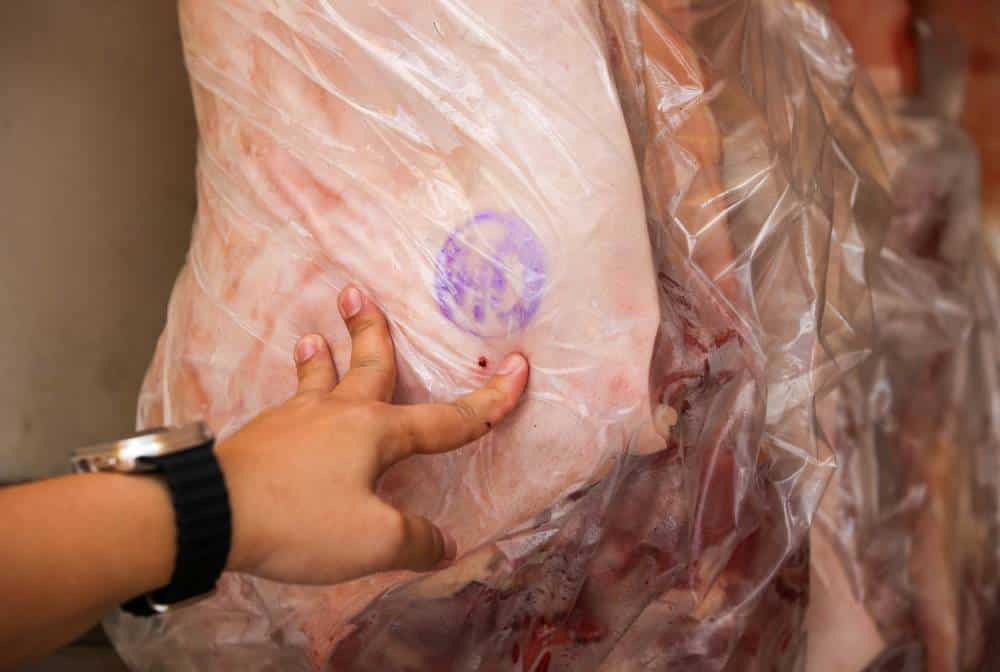Philippines to import more meat products as low supply foreseen amid ASF

FILE PHOTO: Staff from the City Veterinary Office of Marikina City Meat Inspection Unit inspect freshly slaughtered carcass inside a delivery van that just arrived at their Single Port Entry site on August 15, 2024. All meat products must pass through checking here before delivery in public markets, supermarkets, restaurants, other sellers in the city. The CVO requires the meat delivery trucks to also be registered with them and in good working condition. Carcass hung from the hooks must also have plastic wrapping at the end to prevent blood from dripping to the floors and to minimize contamination as these are loaded and taken from the vehicles, especially with the problem of African swine fever (ASF). Marikina has no slaughterhouses and gets supplies from Antipolo City, Quezon City, Rizal, Bulacan, and Tarlac provinces. INQUIRER /LYN RILLON
The Philippines is seen to continue importing more meat products this year due to supply challenges caused by the African swine fever (ASF), the Bureau of Animal Industry (BAI) said.
In its latest report, the BAI said the volume of imported meat inched up by 7.8 percent to 757.3 million kilograms in the first seven months of this year from 702.24 million kg in the same period a year ago.
“The increase is due to the anticipated low supply due to ASF. Expect higher imports [in 2024] versus last year,” Agriculture Assistant Secretary Arnel de Mesa said in a message, quoting the BAI.
On a monthly basis, the BAI noted that the country imported 109.55 million kg of meat in July alone, down by 1.72 percent.
The volume of imported meat brought into the archipelago has been on a downtrend from May to July following consecutive increases in previous months.
READ: PH buys more pork overseas amid swine flu, El Niño
Pork continues to take a lion’s share in meat imports, holding a share of 49.2 percent or 372.94 million kg of the total. The volume represented an increment of 7.5 percent, the majority of which were pork cuts and offals.
Chicken came next with 255.38 million kg, equivalent to 33.7 percent, increasing by 2.4 percent from last year. Importers mostly sourced mechanically deboned meat or mechanically separated chicken.
Among the meat varieties, beef posted the largest increment at 30.85 percent, ending at 101.69 million kg. It accounted for 13.4 percent of the total, mostly beef cuts.
Other meat products sourced from abroad were buffalo (25.9 million kg), turkey (897,369 kg), lamb (401,065 kg), and duck (96,271 kg).
Under Executive Order No. 62 signed by President Ferdinand Marcos Jr. in June, tariff rate on swine, fresh, chilled or frozen meat is kept at 15 percent for those within the minimum access volume (MAV) or the tariff quota and 25 percent for out-quota shipment. For mechanically deboned or separated meat, the duty is 5 percent.
READ: Chicken, fish production expansion in PH urged amid ASF resurgence
The Philippines is grappling with a new wave of ASF infections, with the BAI tally showing there are active cases in 14 regions, 30 provinces, and 122 municipalities as of Oct. 2.
Since recording the first outbreak in 2019, the BAI said the ASF has infected 17 regions and 76 provinces nationwide.
To prevent the spread of this animal disease, the Department of Agriculture (DA) initiated the government-controlled vaccination in Lobo, Batangas — the ground zero for the ASF resurgence — in August using ASF vaccines from AVAC Vietnam.
The DA was targeting to complete the procurement of 600,000 doses of ASF vaccines by end-December.